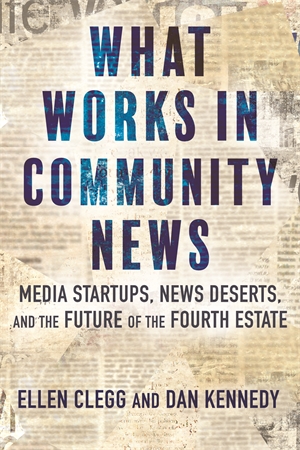 Ellen Clegg and I are thrilled to go public today with our book, “What Works in Community News: Media Startups, News Deserts, and the Future of the Fourth Estate,” to be published on Jan. 9 by Beacon Press.
Ellen Clegg and I are thrilled to go public today with our book, “What Works in Community News: Media Startups, News Deserts, and the Future of the Fourth Estate,” to be published on Jan. 9 by Beacon Press.
The book consists of a close look at nine different regions in the U.S. and the independent news organizations that are serving them, ranging from tiny outlets like The Mendocino Voice in Northern California and The Bedford Citizen in Greater Boston to larger statewide projects like NJ Spotlight News and The Texas Tribune; and from rural newspapers like The Storm Lake Times Pilot in Iowa to urban outlets serving communities of color like MLK50: Justice Through Journalism in Memphis, Tennessee, and the New Haven Independent.
We also include a series of conversations drawn from our podcast with leaders, thinkers and entrepreneurs in local news.
Through a blend of on-the-ground reporting and interviews, we show how these operations found seed money and support, and how they hired staff, forged their missions, and navigated challenges from the pandemic to police intimidation to stand as the last bastion of collective truth — and keep local news in local hands.
“What Works in Community News” is already receiving praise from such important figures as Margaret Sullivan, Steven Waldman, Penelope Abernathy, Greg Moore, Victor Pickard and Anne Galloway.
It’s been quite a ride. We can’t wait to share what we learned with you.
Advance orders are available through:





